Inspired by actual television interruptions that occurred in Chicago in the late 1980s, BROADCAST SIGNAL INTRUSION is a captivating and terror-filled journey of one man as the line between fantasy and reality blur with obsession as burgeoning technology of the day may hold the key to a traumatic event in his past and potential danger in his future. A riveting sensory fueled obsessive mania that intensifies into a tension-fueled explosive final act that is killer.
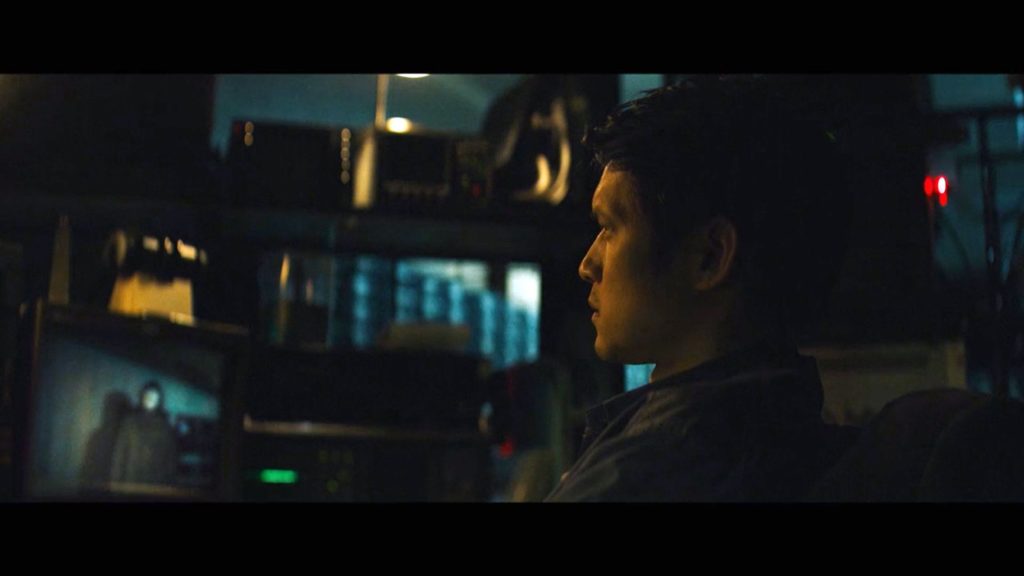
Directed by Jacob Gentry with script by Phil Drinkwater and Tim Woodall, BROADCAST SIGNAL INTRUSION stars Harry Shum Jr as video archivist and editor James who is working on an archival project logging decades-old TV broadcasts (long before the days of digital archive preservation). During this process, James discovers a surreal and very disturbing broadcast interruption which he believes to be the product of a signal hack. Curious, James starts to track down other similar broadcast signal intrusions. Now obsessed, James lets his mind wander and wonder, assembling clues that make him believe that these interruptions are not only clues to a horrific crime but that whoever is behind them knows that James is close to uncovering the truth,
An original concept conceived by taking known instances of “broadcast signal intrusions” in real life and melding that with the inspiration of a semi-famous “Max Headroom” intrusion event and crafting a story around that with an almost “scavenger hunt” scenario that employs grainy old VHS video pulled from analog broadcasts and then layering that with multiple layers of altered sound with everything from voice to Morse Code, tapping into the “audio-video” of broadcasting and the audio/video sensory experiences and processes of humans. The result is a sensory experience that is insanely delicious! — …. / — -.– / –. — -.. !!!
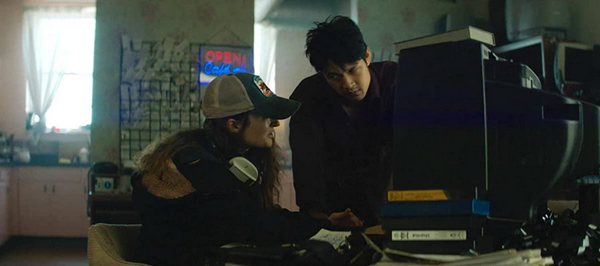
The twists and turns of BROADCAST SIGNAL INTRUSION extend beyond events in the story and into the character of James himself as his obsession begins to blur the line between fantasy and reality, creating ambiguity that by the third act raises red flags that he may somehow be involved in the disruptions. What was he doing in his past? Could he have been behind the intrusions at one time?
Ambiguity is a real watchword here, especially once a stranger named Alice appears on the scene. Mysteriously and inquisitively played by Kelley Mack, that throws another monkey wrench into the increasing ambiguity and suspense. Is Alice involved or does she know more than she’s saying? Each person whom James encounters raises suspicion and by extension casts doubts on the reliability of his POV or his reliability as a narrator, making us ever leery of James’ obsession, which only intensifies as the film progresses, fueling the tension and our interest ever higher.
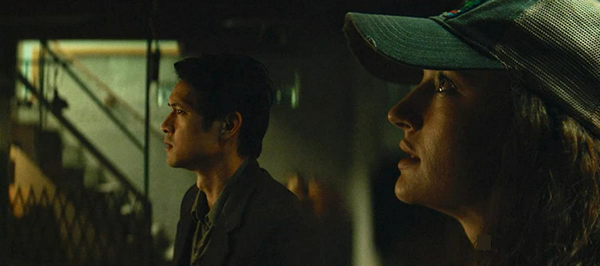
But underneath the obvious mystery of the intrusions is the driving force of James’ emotional journey as he goes down the rabbit hole of grief and despair and his inability to connect with reality and rationality following the disappearance of a loved one some years earlier.
As James, Harry Shum Jr knocks it out of the park on the “scared shitless but trying not to show it” performance BUT where he really excels is with the edginess of curiosity layered on top of the fear. Shum does a terrific job finding that balance of the two emotions before diving into blinding rage and insanity in the third act which also delivers some last minute shocking twists that make you rethink everything you thought you knew about James. His facial expressiveness is telling and powerful. We feel his obsession and his need to follow all the clues of these signal mysteries. On screen for the entire film but for maybe one or two scenes, Shum is relentless in his performance, keeping us on this wild ride with him.
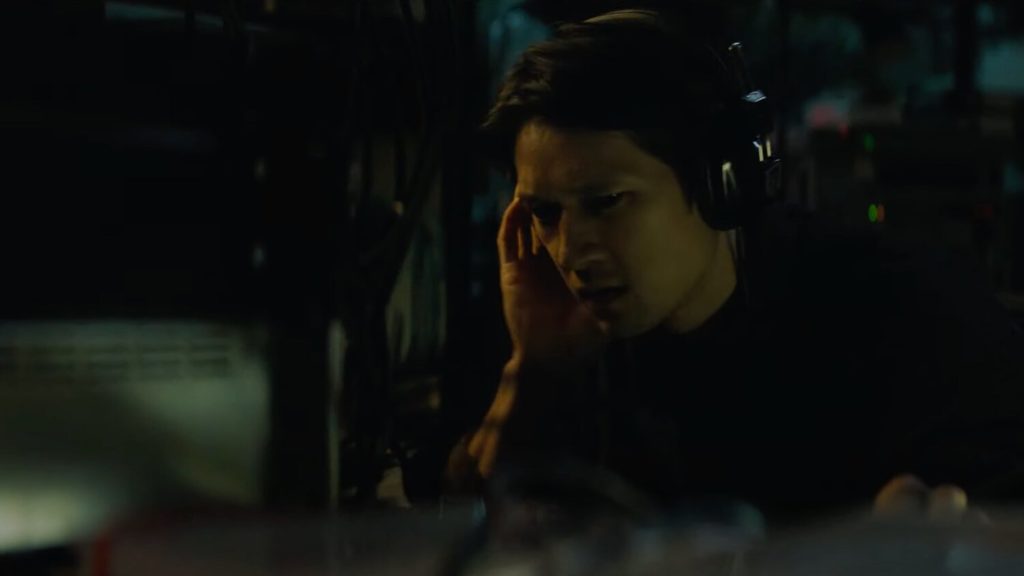
As Stephen Meyer, Chris Sullivan makes your skin crawl with a calm skeeviness that arouses our spidey senses that he’s hiding something as he calmly regales his life story to James and Alice, a story that may or may not be tied to these fantastique-styled visual signal interruptions.
The marriage of Ben Lovett’s score with the soundscape is to die for. A perfect sonic meld of score with a soundscape of distortion and effects and practical sound is killer. The sound team does an incredible job with sound editing and mixing, keeping us on our toes and never letting us get comfortable, even for a minute.
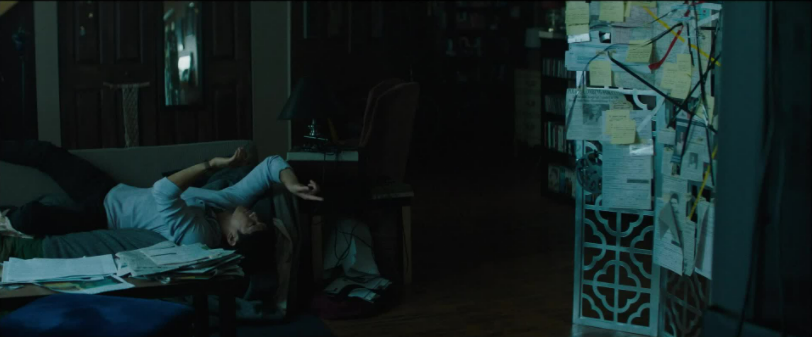
The visual tonal bandwidth of BROADCAST SIGNAL INTRUSION is beyond effective; immersive. Cinematographer Scott Thiele delivers a beautiful inky-blue noirish lighting and color palette which is then contrasted by the period-perfect graininess of black & white VHS analog broadcast signal interruption, thus metaphorically speaking to the two worlds which James cannot reconcile – reality and the nightmarish haunting within his mind. So interesting and so effective. Close-ups, particularly in the first act, tacitly show us James’ obsessive intense nature as he buries himself in his video work. Head down, he is focused and that focus makes his obsession with the tapes and the interruptions believable.
But going beyond Thiele’s work is that of Dan Martin, the man responsible for creating and lensing the broadcast signal intrusions. From denatured and tinted footage to VHS graininess complete with riveting ECUs and unusual camera dutching, Martin delivers a chilling fantastique eerie weirdness.

There are no interruptions in the cinematic achievement of BROADCAST SIGNAL INTRUSION as, from beginning to end, Gentry and company keep us on the edge of our seats with tenterhooks of terror and tension, taking us down the rabbit hole with James, leaving us wanting more; more terror, more blood, more mystery, and more broadcast signal intrusions.
Directed by Jacob Gentry
Written by Phil Drinkwater and Tim Woodall
Cast: Harry Shum Jr, Kelley Mack, Chris Sullivan, Jennifer Jelsema, Arif Yampolsky, Justin Welborn, Michael B. Woods, and Steve Pringle
by debbie elias, 10/9/2021












